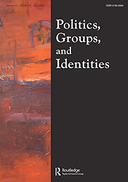Politics, groups, and identities
Abbreviation:
Polit. Groups Identities
Published by:
Informa - Taylor and Francis Group
Publisher Location: Abingdon, OXF
Journal Website:
https://www.tandfonline.com/loi/rpgi20
Range of citations in the SafetyLit database:
2021; ePub(ePub) --
2022; 10(3)
Publication Date Range:
2013 --
Number of articles from this journal included in the SafetyLit database:
4
(Download all articles from this journal in CSV format.)
pISSN = 2156-5503 | eISSN = 2156-5511
LCCN = 2010202401 | USNLM = 101664135 | OCLC = 648721907
Find a library that holds this journal: http://worldcat.org/issn/21565503
Journal Language(s):
English
Aims and Scope (from publisher):
Politics, Groups, and Identities is an official journal of the Western Political Science Association. It presents the best scholarship on social groups, exploring the politics of gender, race, ethnicity, religion, sexuality, class and other dimensions of identity and structural disadvantage. The journal publishes work across all subfields of political science, as well as the social sciences and humanities more generally. The journal publishes research on any country or region of the world, including work that is global or international in scope as well as work that is national or local, or examines connections between these levels.
Politics, Groups, and Identities is interdisciplinary in focus. The editors are open to a wide range of analytic approaches, including interpretive, ethnographic, historical, statistical, and multi-method analyses. In addition to publishing original research articles, the editors also seek proposals for integrative review essays as well as symposia on specific topics or dimensions of the politics of social groups. The editors are especially interested in proposals that would promote discussion among scholars on innovative topics or projects. These discussions might take several forms, including but not limited to (1) a set of pieces tackling a common question or debate, (2) a research article with several responses and a rejoinder, (3) “thought” pieces with responses from a variety of perspectives, and (4) research workshops in which novel methodologies or analytical approaches are presented and critiqued.
